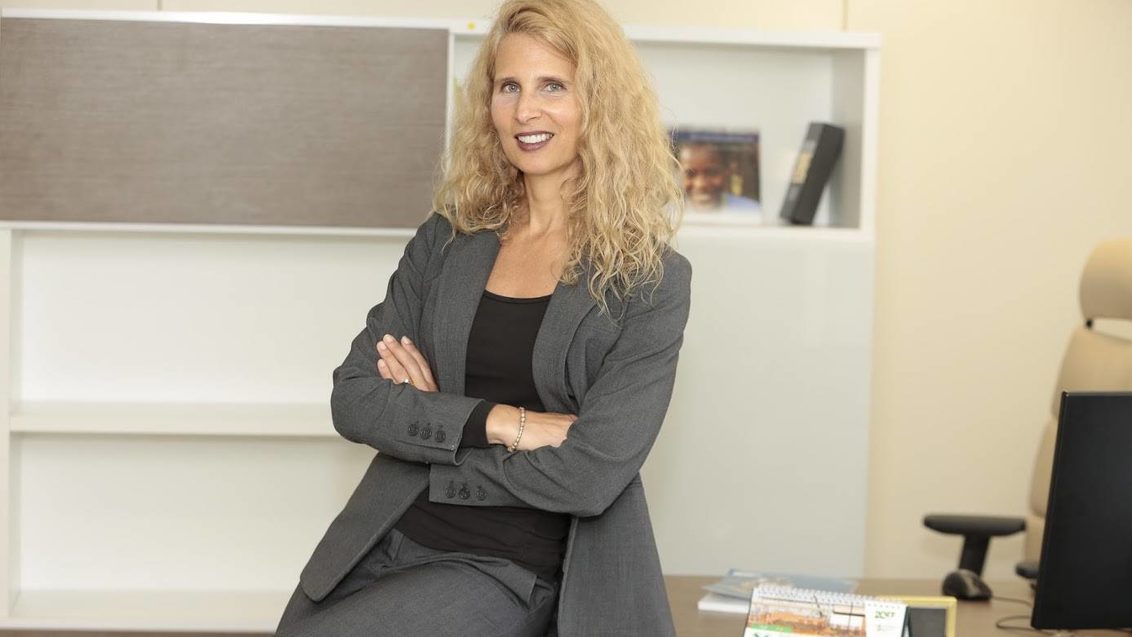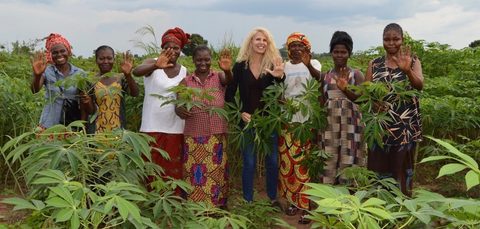“I’m delighted to support livelihood improvements”

Jennifer Blanke recently joined our Board. We asked her why, how we’ll benefit, and where she sees the Foundation going. She also told us about her professional background and what else is currently keeping her busy. (Read the French version)
Syngenta Foundation: Welcome! How has your return to Switzerland been?
Jennifer Blanke: It’s great to be back. Until last summer I was living in Abidjan, Côte d’Ivoire, which I really enjoyed – the people, the culture, weather, and food. But the pandemic meant I was suddenly locked down there by myself for several months, separated from my family. It’s been a relief to return to Switzerland and reunite. One thing I also missed in Abidjan were the changing seasons. I’ve really enjoyed watching the leaves turn color this Swiss fall – but maybe that is also due to the monotony of lockdown!
In Abidjan, you worked for the African Development Bank (AfDB). Before that, you were with the World Economic Forum (WEF). What can you tell us about your roles there?
I’m a development economist and have focused for many years on issues related to growth and development. At the WEF, I oversaw research and programs on issues like economic competitiveness and global risks. My goal was to make complex issues understandable. Our team helped leaders understand where to focus – for example on creating better markets or improving education. The WEF’s high-level participation makes it an incredible platform for changing mindsets to spur positive change.
How did that differ from your tasks at the AfDB?
My time there was more related to economic development on the ground. I oversaw the Bank’s lending and program work across multiple sectors. These included agriculture and agroindustry, water and sanitation, education and health, but also the cross-cutting issues of gender equity and job creation. It was particularly satisfying to see how the Bank’s efforts directly affect Africans’ lives.
You are now at an insurance company. What is the particular fascination here?
I’m a Non-Executive Director at ARC Ltd. That’s the financial affiliate of African Risk Capacity, an agency under the African Union. We help African countries develop risk management and prepare better for natural disasters. Risk management is critical for building resilience. ARC Ltd. delivers an important part of the solution – and its payouts support household incomes, for example following a drought. Those funds reach beneficiaries much faster than humanitarian relief can. Control is in the hands of Africans and African institutions, rather than international agencies. I am a fan of market-based solutions for development challenges. I also find it really compelling that ARC is an African solution to an African challenge.
What attracted you to join our Board?
I very much like the Foundation’s approach to development. Agriculture holds the key to development in many parts of the world, and certainly in those where the Foundation is active. A big challenge is that in many countries agricultural productivity is still at pre-industrial levels. Technologies and know-how are available that could make a big difference, but they aren’t yet getting to every smallholder. The Foundation spans work from R&D to markets and it partners with key actors including the private sector. That is already making a measurable impact. I am delighted to join the Board to support the next improvements to rural livelihoods.
You are joining at a particularly challenging time. What does success look like to you at the moment?
The world is experiencing numerous challenges, not least of which is the pandemic. COVID-19 is constraining resources and causing everyone to re-evaluate their focus and preconceived ideas. Yet every crisis is also an opportunity. There is growing recognition that ‘things can’t continue as they have’. The Foundation has a big role to play in shifting mindsets and making the case for investment in sustainable and inclusive agriculture. Trillions of taxpayer dollars are currently going into propping up economies and traditional companies. At least a small part of that money should go into more sustainable and inclusive business models supporting food systems. That would be a success!
How do you see our Foundation developing in the longer term?
I see several parallel paths. One is becoming even more financially self-sustaining, in partnership with other key players in development and agriculture. Another is moving smallholders towards higher value-added activities, applying the latest technologies and knowledge. Areas on which I would personally like to see more focus are nutrition and gender-adapted solutions. Those would put the Foundation and its beneficiaries on a stronger footing. It will also be important to push even further in harnessing the incredible ingenuity of young people. They have excellent ideas for social and sustainable businesses but need technical and financial support to bring these to life.
You have experience in economic development and leading large multicultural teams. How do you see us benefiting?
As a manager, I have done or tried to do many of the things that the Foundation seeks to achieve. I am delighted to contribute my experience to support the teams in making this happen. My systems approach can help avoid the siloed thinking that stops some development initiatives from reaching their full potential.
“The tone”, it’s said, “is set at the top”. What’s your view?
That’s true, both for organizations’ values and culture. I would never ask a team member to do anything I would be unwilling to do myself. I will always have the best interests of the institution and beneficiaries at heart. It is so important that top managers and Board members lead by example. That is particularly critical for the latter because Boards have ultimate accountability for their organizations.
Getting funding for agriculture is currently more challenging than for some other topics. How do you think the Foundation can mobilize more resources?
Funding and other investment follow good ideas and impactful work. The Foundation must respond clearly to needs on the ground with sound analysis and valuable innovations. It’s in a strong position to lay out the case for sustainable and inclusive agriculture and to involve key partners to magnify impact.
What do you most like doing in your spare time?
Spending time with my family. We have two teenagers; they will be off living their own lives soon enough, so I savor the moment. Under normal circumstances, I would add spending time with good friends, too. That’s a bit of a challenge right now. I also love to read, especially novels which are an excellent escape to other times and places. And I am an avid runner, something I enjoy especially in good weather, which has helped keep me sane during these challenging times!

